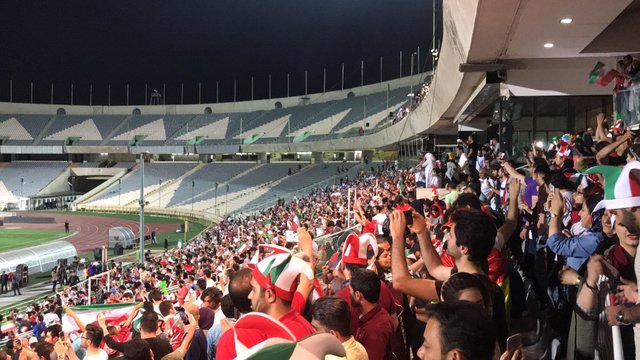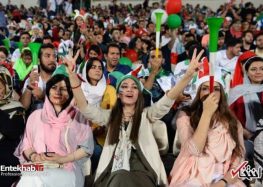Iran-Spain Match Aftermath: Will Iran’s Ban on Women in Sports Stadiums Finally Be Lifted?

Iranian Women Allowed Into Tehran’s Azadi Stadium to Watch World Cup Screening But Official Ban Persists
The presence of women in Iran’s Azadi Stadium in Tehran for the first time after more than three decades to watch the World Cup soccer match between Iran and Spain–and the possibility that they could again be permitted to attend next week’s screening of Iran’s game against Portugal–has raised this question: Will Iran’s ban on women in stadiums be permanently lifted?
Women have been banned from Iranian stadiums since shortly after the country’s 1979 Islamic Revolution. Throughout the decades, they have braved arrest by entering them disguised as men and protesting outside.
International organizations and activists around the world have also joined the call, including 18 prestigious women of Iranian origin living outside the country.
It’s unknown exactly which Iranian official ordered the ban to be lifted to allow women to attend the mixed-gender screening on June 20, 2018. Some commentators speculated that the order came from President Hassan Rouhani, who recently criticized the ban. But there has been no official acknowledgement of the source.
Iranian conservatives have long claimed that the country’s stadiums aren’t safe, but those who did attend were able to enjoy themselves and leave the event comfortably and securely.
The fact that thousands of male and female attendees experienced a safe and respectful atmosphere in the stadium has put into question claims by conservatives, who argue that stadiums are improper for women. The chance that the long, peaceful fight to end the ban has finally succeeded has meanwhile increased.
Many Iranians expect the authorities to once again allow women to watch Iran’s next World Cup soccer match at Azadi Stadium on June 24 and hope the ban will be lifted once and for all. The images on social media and the front pages of newspapers showing women and men cheering their team on side by side will weigh heavily on proponents of the ban, who will be seen as opposing the spirit and will of the vast majority of the Iranian people.
Approved, Cancelled, Approved Again
Twenty thousand people had purchased tickets to attend the June 20 mixed-gender, live-screening of the Iran-Spain match, but the doors were only opened after the event was suddenly cancelled and suddenly re-launched an hour before the game.
Azadi Stadium can fit 100,000 people, but due to the last-minute cancellation, only about 7,000 women and men ultimately watched the match on the big screen according to the state-funded Iranian Students News Agency (ISNA).
The Iranian Pupils News Agency, PANA, reported on June 21, a day after the event, that the ban was lifted by a “direct order to the Interior Ministry by the president himself.” The report was confirmed by Iran’s Vice President for Women and Family Affairs Masoumeh Ebtekar, who attended the match.
“Last night families, women, men, children and youngsters watched our national team’s good match next to each other inside Azadi Stadium. The joy and excitement of watching a game inside a sports arena is something else. I thank all who made this happen. In the future we will witness the continuation of this trend, God willing,” she tweeted.
Shargh newspaper reporter Mahsa Jazini tweeted, “Mr. President, now that you have ordered the gates open, can’t you issue another order that they should never be closed?”
Another Iranian on Twitter, theater director “Negar,” posted a video clip of people celebrating in the stadium, tweeting: “This is what it means to feel joy and passion together. This is what real Azadi (“Freedom”) means in the 100-000-seat stadium. This is just the beginning. We will not stop our struggle until we achieve our main goal to watch football matches (inside the stadium.)”
Governor’s Order Ignored
On June 19, Iranian media outlets published a letter by the deputy head of security at the Tehran Governor’s Office, Mohsen Hamadani, addressing Tehran Police Chief General Hossein Rahimi, which stated: “In the opinion of the head of the province’s Security Committee, watching the World Cup matches in Azadi and Takhti sport arenas is not a problem if Islamic morals are observed.”
“This will have a positive impact in reducing excitement over the victory of the Iranian national team and increase public order in the streets and throughout the city,” added the Tehran governor. “Therefore, please order your units to cooperate with the said venues to facilitate these events.”
Following the announcement, more than 20,000 tickets were sold for the match. However, just hours before kickoff, special police units blocked the gates and fans were told the event had been canceled.
Some state reporters suggested the event had been cancelled by order of the Tehran Prosecutor’s Office. But the hardline Tasnim News Agency, which maintains close ties with the prosecutor and the Islamic Revolutionary Guard Corps (IRGC), quoted an “informed source” stating that the prosecutor had not interfered at all.
Iranians Protest Outside the Stadium and on Social Media
Dozens of Iranian ticket-holders booed and chanted slogans outside the stadium after they were blocked from entering the stadium.
The cancellation also triggered a Twitter storm as supporters of women’s equality in Iran raised their voices.
“Cancelling the screening of the soccer match between Iran and Spain in Azadi Stadium makes no sense and only shows fear towards the people,” tweeted prominent reformist commentator Abbas Abdi.
Theater director “Negar” tweeted a photo of crowds protesting the ban in front of Azadi Stadium, adding: “For the record in history: Women and men sitting on the ground next to each other in front of policemen to protest preventing families from going inside the stadium.”
But an hour before the event, the ban was suddenly lifted.
“The gates of Azadi Stadium opened under the pressure of public opinion and the interior minister’s order and families got to go inside Azadi Stadium after 40 years,” tweeted journalist Mira Ghorbanifar.






